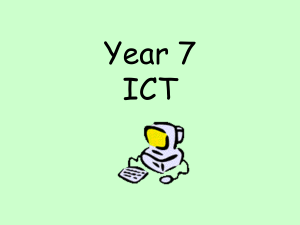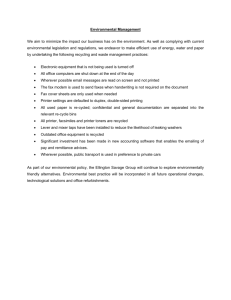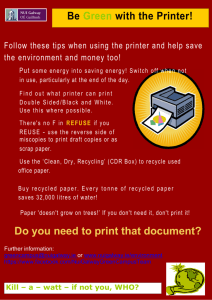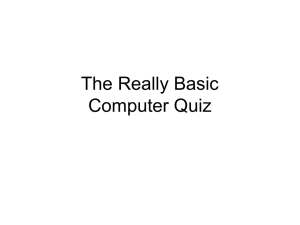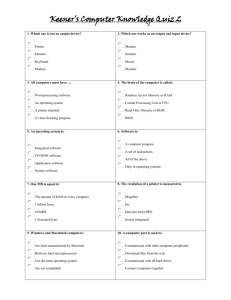What is a printer?
advertisement
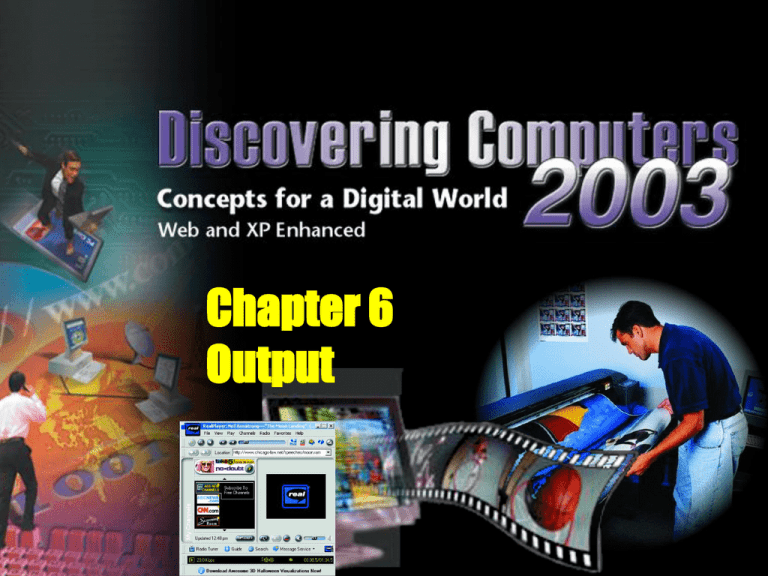
Chapter 6 Output Chapter 6 Objectives Define the four categories of output Describe the uses of speakers and headsets Identify the different types of display devices Identify the purpose of data projectors, fax machines, and multifunction devices Describe factors that affect the quality of a display device Explain how a terminal is both an input and output device Identify monitor ergonomic issues Identify output options for physically challenged users Explain the differences among various types of printers Next p. 6.2 What is Output? What Is output? Data that has been processed into a useful form, called information text graphics video Next p. 6.2 Fig. 6-1 audio What Are Output Devices? What is an output device? Any hardware component that can convey information to a user monitor printer Click to view video Next p. 6.4 speakers Display Devices What is a display device? Television-like Information on a display device sometimes is called soft copy Next p. 6.4 Display Devices What is a CRT monitor? Large sealed, glass screen Screen coated with tiny dots of phosphor material Pixel, or picture element, is single point in electronic image Three dots (red, blue, and green) combine to make up each pixel cathode ray tube CRT monitor Next p. 6.5 Fig. 6-3 screen Display Devices What are typical sizes for CRT monitors? Next p. 6.5 15, 17, 19, 21, and 22 inch screen size Viewable size is diagonal measurement of actual viewing area provided by the monitor Display Devices What is a liquid crystal display (LCD) monitor? Type of flat-panel display Uses liquid crystals between two sheets of material to present information on screen Electric current passes through crystals, which Next creates images on p. 6.5 Fig. 6-4 the screen Display Devices Where are some features of LCD screens? Lightweight and compact Consumes less than one-third of the power than does a CRT monitor Ideal for notebook and handheld computers Next p. 6.6 Fig. 6-5 Display Devices What is a Web-enabled device? Allows access to the Web or e-mail • Cellular telephones • Pagers Many use monochrome LCD displays to save battery power Click to view Web Link then click Web-enabled Devices Next p. 6.6 Fig. 6-6 Display Devices What is an electronic book (e-book) ? Small, book-sized computer that uses an LCD screen Allows users to read, save, highlight, bookmark, and add notes to online text Download new book content from Web Next p. 6.7 Fig. 6-7 Display Devices What are the two technologies used for LCD monitors? Active-matrix display • Can display high-quality Next p. 6.8 color viewable from all angles Passive-matrix display • Color often not as bright • Images best viewed when working directly in front of display Display Devices What is a gas plasma monitor? Flat-panel display uses layer of gas plasma between two sheets of material Larger screen sizes and higher display quality than LCD, but much more expensive Next p. 6.8 Fig. 6-8 Display Devices What is display resolution? Describes the sharpness and clarity of image The higher the resolution, the sharper the image and the more that can display on the monitor 800 x 600 most common 1280 x 1024 maximum resolution of most monitors Next p. 6.8 2048 x 1536 maximum for high-end monitors 800 horizontal pixels 600 vertical pixels Total of 480,000 pixels on screen Display Devices What is dot pitch? Measure of the distance between pixels Sometimes called pixel pitch Smaller the distance between the pixels, the Click to sharper the image view animation Next p. 6.9 Use a monitor with a dot pitch of .29 millimeters or lower to minimize eye fatigue Display Devices What is refresh rate? Speed at which monitor redraws images on the screen Should be fast enough to maintain a constant, flicker-free image High-quality monitor will provide refresh rate of at least 75 hertz Next p. 6.9 Image on the screen redraws itself 75 times per second Display Devices What is a video card? Converts digital output from computer into analog video signal Controls how display device produces picture Also called graphics card or video adapter Next p. 6.10 Display Devices Step 1 How does video travel from the processor to a CRT monitor? 1: Processor sends digital data to video card 2: Video card converts digital data to analog signal 3: Analog signal sent via cable to CRT monitor 4: CRT separates signal into red, green, and blue signals 5: Electron guns fire color signals to front of CRT 6: Image displays Next p. 6.10 Fig. 6-10 Step 2 Step 3 Step 4 Step 5 Step 6 Display Devices What is bit depth? Next p. 6.10 Number of bits a video card uses to store information about each pixel Also called color depth Determines number of colors a video card can display Greater the number of bits, better the resulting image 8-bit video card Uses 8 bits to store information about each pixel Can display 256 different colors 24-bit video card Uses 24 bits to store information about each pixel Can display 16.7 million colors 28 = 2x2x 2x2x 2x2x 2x2= 256 colors 224 = 16.7 million colors Display Devices What are video standards? Video Electronics Standards Association (VESA) develops video standards Next p. 6.11 Fig. 6-11 Display Devices What are various video card configurations? Next p. 6.11 Fig. 6-12 Display Devices What is electromagnetic radiation (EMR)? Magnetic field that travels at speed of light Small amount produced by all CRT monitors Next p. 6.11 Sit at arm’s length from CRT EMR is greatest on sides and back of CRT monitor LCD monitors do not pose this risk Display Devices What is the ENERGY STAR® program? Program to encourage manufacturers to create energy-efficient devices that require little power when not in use Monitors and devices meeting guidelines display ENERGY STAR® label Next p. 6.12 Fig. 6-13 Display Devices What is Interactive TV? Two-way communications technology in which users interact with television programming HDTV works directly with interactive TV Select a movie from a central library of movies Next p. 6.12 Play games Bank Vote or respond to network questionnaires Shop Printers What is a printer? Output device that produces text and graphics on paper Result is hard copy, or printout Two orientations portrait orientation Click to view animation Next p. 6.12 Fig. 6-14 landscape orientation Printers What is an impact printer? Next p. 6.14 Forms characters by striking a mechanism against ink ribbon that physically contacts paper Ideal for printing multipart forms Can withstand dusty environments, vibrations, and extreme temperatures Printers What is a dot-matrix printer? Impact printer that produces printed images when tiny wire pins on print head mechanism strike inked ribbon Most use continuous-form paper continuous-form paper Next p. 6.14 Fig. 6-17 Printers How does a dot-matrix printer work? When ribbon presses against paper, it creates dots that form characters and graphics A higher number of pins (9 to 24) means printer prints more dots per character, which results in higher print quality Next p. 6.14 Fig. 6-17 dots form characters Printers What is a line printer? High-speed impact printer that prints entire line at a time Speed measured by number of lines per minute (lpm) it can print Band printer prints fully-formed characters using a hammer mechanism Shuttle-matrix printer is highspeed printer that works more like a dot-matrix printer Next p. 6.14 Fig. 6-18 Printers What is a non-impact printer? Forms characters and graphics on piece of paper without actually striking paper thermal printer ink-jet printer Next p. 6.15 laser printer Printers What is an ink-jet printer? Nonimpact printer forms characters and graphics by spraying tiny drops of liquid ink onto piece of paper Most popular type Click to view of color printer for Web Link then click home use Ink-Jet Printers Next p. 6.15 Fig. 6-19 Printers What is the resolution of a printer? Sharpness and clarity of characters Measured by number of dots per inch (dpi) printer can output 300 dpi Next p. 6.15 Fig. 6-20 600 dpi 1,200 dpi Printers How does an ink-jet printer work? Print cartridge firing chamber nozzle print head resistor 2: Vapor bubble forces ink through nozzle Next p. 6.16 Fig. 6-21 1: Small resistor heats ink, causing ink to boil and form vapor bubble 3: Ink drops onto paper ink dot 4: As vapor bubble collapses, fresh ink is drawn into firing chamber bubble nozzle ink paper Printers What is a laser printer? Click to view Web Link then click Laser Printers Next p. 6.16 Fig. 6-17 High-speed, highquality nonimpact printer Prints text and graphics in very high-quality resolution, ranging from 600 to 1,200 dpi Typically costs more than ink-jet printer, but is much faster Printers 1: Drum rotates as paper is fed through 2: Mirror deflects laser beam across surface of drum 3: Laser beam creates charge that causes toner to stick to drum 4: As drum rotates, toner transfers from drum to paper 5: Rollers use heat and pressure to fuse toner to paper Next p. 6.17 Fig. 6-23 How does a laser printer work? rotating mirror drum rollers Printers What is a thermal printer? Generates images by pushing electrically heated pins against heat-sensitive paper Ideal for small devices, such as adding machines Next p. 6.19 Fig. 6-24 Printers What is a photo printer? Color printer that produces photo lab quality pictures and prints Click to view everyday Web Link then click Photo Printers documents Next p. 6.20 Fig. 6-25 Select image to print, number of copies, and size of print Printers What is a label printer? Small printer that prints on adhesive type material that can be placed on a variety of items Most also print bar codes and e-stamps Next p. 6.21 Fig. 6-26 Printers What is a portable printer? Small, lightweight inkjet or thermal printer that allows mobile user to print from notebook or handheld computer while traveling Next p. 6.22 Fig. 6-27 portable printer Printers What is a plotter? Sophisticated printer used to produce highquality drawings Large-format printer similar to plotter and is used to print quality color prints Next p. 6.22 large-format printer plotter Speakers and Headsets What is an audio output device? Computer component that produces music, speech, and other sounds Speakers and headsets are common devices speakers Next p. 6.23 Fig. 6-29 woofer Speakers and Headsets What is voice output? Computer talks to you through speakers on computer Next p. 6.24 Fig. 6-31 link to audio broadcast RealPlayer Speakers and Headsets What is Internet telephony? Next p. 6.24 Allows you to have a conversation over the Web, just as if you were talking on the telephone Other Output Devices What is a data projector? Device that takes image from a computer screen and projects it onto a larger screen data projector Next p. 6.25 Fig. 6-32 Other Output Devices What is a facsimile (fax) machine? Device that transmits and receives documents over telephone lines fax machine Next p. 6.25 Fig. 6-33 Other Output Devices What is a fax modem? Modem that allows you to send and receive electronic documents as faxes Click to view Web Link then click Fax Modems Next p. 6.26 Fig. 6-34 external fax modem internal fax modem card in system unit Other Output Devices What is a multifunction device (MFD) ? Provides the functionality of a printer, scanner, copy machine, and fax machine Click to view Web Link then click Multifunction Devices Next p. 6.26 Fig. 6-35 all in one Terminals What is a terminal? Device that performs both input and output dumb terminals Next p. 6.27 intelligent terminals specialpurpose terminals Terminals What is a dumb terminal? Has a keyboard and monitor, but no processor or memory Connects to host computer that performs processing and then sends output back Next p. 6.27 Fig. 6-36 keyboard and monitor Terminals What is an intelligent terminal? Has monitor, keyboard, memory and processor Similar to a PC in that it can perform tasks independent of host computer Programmable Next p. 6.28 intelligent terminal host computer Terminals What is a point-of-sale (POS) terminal? Records purchases at point where purchase is made Output from POS terminals serves as input to host computer POS terminal in a grocery store Click to view Web Link then click POS Terminals Next p. 6.28 Fig. 6-37 scanner and keyboard are input Terminals What is an automated teller machine (ATM)? Click to view video Click to view Web Link then click Automated Teller Machines Next p. 6.29 Fig. 6-37 Self-service banking machine that connects to host computer through telephone network Output Devices for Physically Challenged Users What is the Magnifier command? Windows Magnifier command enlarges text and other items in window on screen Next Location of mouse pointer magnified at top of screen p. 6.29 Fig. 6-38 Magnifier command Output Devices for Physically Challenged Users What other output options are available for visually impaired users? Click to view video Change Window’s settings such as increasing size or changing color of text to make words easier to read Blind users can work with voice output Braille printer outputs information in Braille onto paper Next p. 6.30 Fig. 6-39 Braille printer Summary What are suggested output devices for the Mobile Home Small Office/Home Office Homeuser? Home 17- or 19-inch color CRT monitor High-definition television Power Ink-jet color printer; or photo printer; or label printer Large Business Speakers and headset Next p. 6.30 Fig. 6-40 Putting It All Together What are suggested output devices for the SOHO user? Mobile Home 19- or 21-inch color CRT monitor Small Office/Home Office Small Office/Home Office Color LCD display for handheld computer Multifunction device; or ink-jet color printer; or Power laser printer, black and white Label printer Fax machine Next Speakers and headset p. 6.30 Fig. 6-40 Large Business Putting It All Together What are suggested output devices for the Mobile user? Mobile Small Office/Home Office Home 15.4-inch color LCD display with notebook computer Mobile 19-inch color CRT monitor for notebook computer docking station Color LCD display for handheld computer Portable printer Power Ink-jet color printer; or laser printer, black and white, for in-office use; or photo printer Fax modem Headset Next DL data projector p. 6.30 Fig. 6-40 Large Business Putting It All Together What are suggested output devices for the Large Business user? Mobile Home 19- or 21-inch color CRT or LCD monitor 15.4-inch color LCD display for notebook computer Small Office/Home Office Large Business Color LCD display for handheld computer Laser printer, black and white Line printer (for large reports from mainframe) Power Label printer Fax machine or fax modem Speakers and headset DLP data projector Next Dumb terminal p. 6.30 Fig. 6-40 Large Business Putting It All Together What are suggested output devices for the Power Mobile user? Small Office/Home Office Home 21-inch color LCD monitor Power Laser printer Plotter Power Photo printer; or dye sublimation printer Large Business Fax machine or fax modem Speakers and headset Next p. 6.30 Fig. 6-40 Summary of Output What is output? What are output devices? Display devices Printers Speakers and headsets Other output devices Terminals Output devices for physically challenged users Chapter 6 Complete

